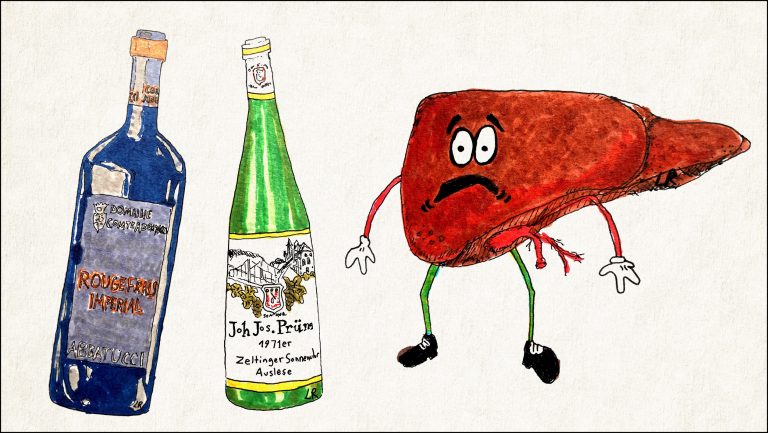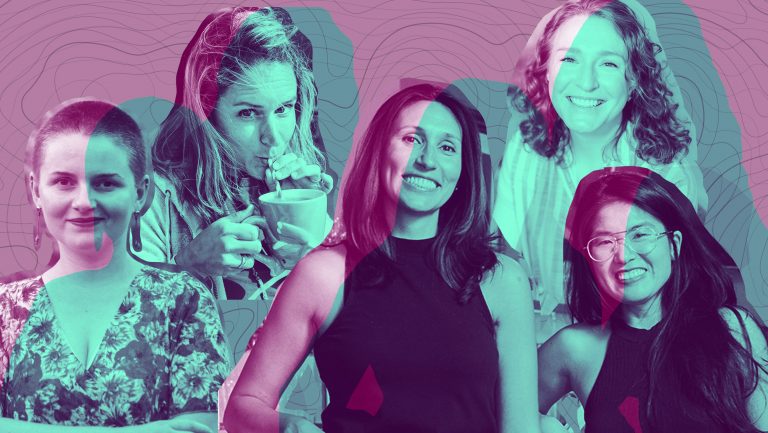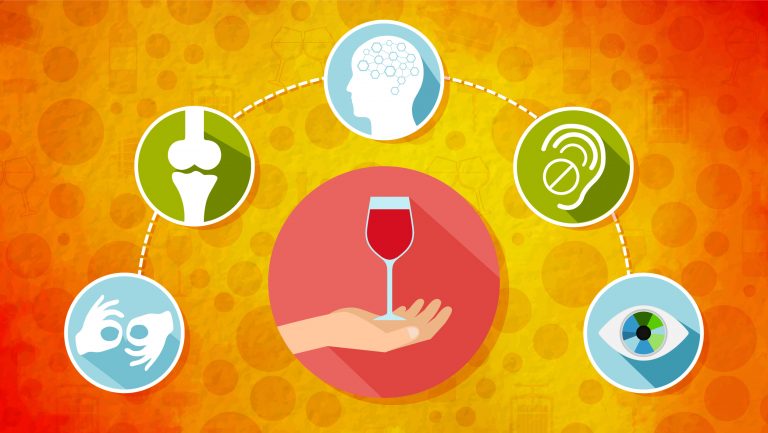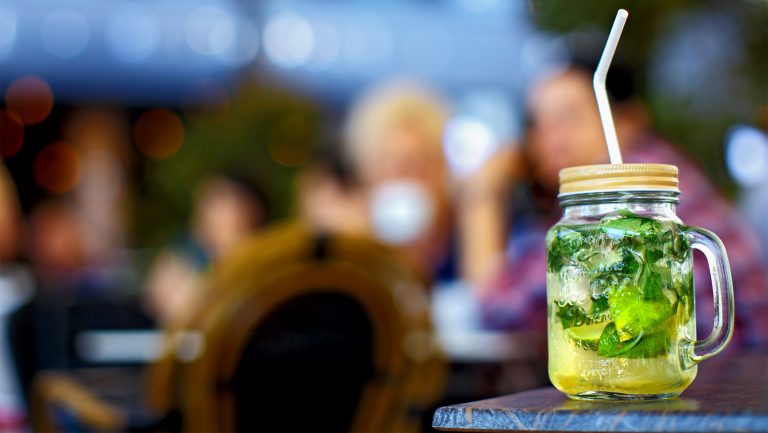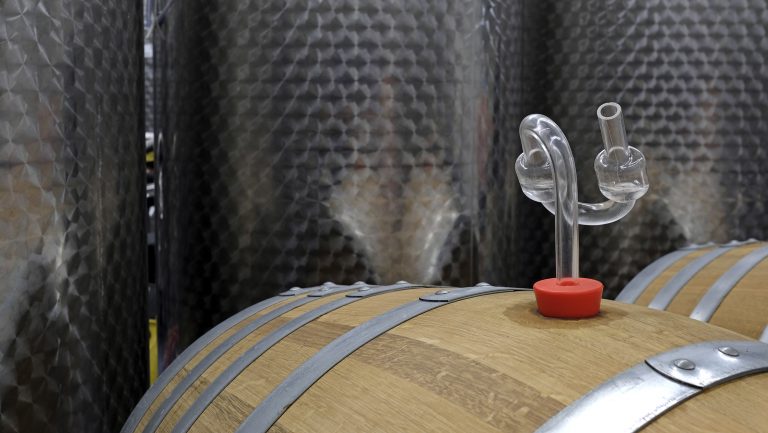The world of sommeliers is a passion-based business. Every night at my restaurant, Cote, a Korean steakhouse in New York City, I host guests from around the world and use my passion for beverages as a tool for hospitality. After all, drinking is convivial—it’s fun and brings people together. Drink sales are also essential to a thriving establishment. If no one drank at Cote, we’d go out of business. So what happens when the beverage director doesn’t drink?
Overall, I like to drink, but the volume of drinks a beverage director is expected to consume can become a bit much. When my fiancé, Lyle, suggested that we give our livers the month off, I happily agreed. But after a few days, Sober October demonstrated to me why it wasn’t so easy to take a month off from drinking: It was bad for business.
Sober October: Week 1
I quickly realize no one else shares in my sober enthusiasm. Cote is a fast-paced restaurant where every night is a party. Our guests like to pop bottles and throw down, often inviting us to join them. Monday night, one of our regulars orders a bottle of Champagne and offers me a glass. I politely decline and mention that I am not drinking for the month. My words were like turning the lights up suddenly at a party—a bit jarring. Later, the guests try to press me into joining them for a glass of Burgundy, which I also decline. In a world where imbibing is a celebration of togetherness, my “message” of abstaining somehow seems self-righteous or ostracizing.

Don’t miss the latest drinks industry news and insights. Sign up for our award-winning newsletters and get insider intel, resources, and trends delivered to your inbox every week.
By Wednesday, I stop telling guests that I’m not drinking after persistent questions such as “Are you pregnant?” and “Is everything okay?”
Thursday night I’m supposed to visit a few cocktail bars with our owner, Simon Kim, and cocktail creator, Devin Kennedy, for ideas and inspiration regarding our soon-to-open speakeasy below the restaurant. As the beverage director, I should really be out there with them. Instead, I pass. I start to wonder: Is not drinking hurting my job?
Sober October: Week 2
Monday morning, I’m a judge at the annual Best Sommelier of the Languedoc-Roussillon competition, and I’m welcomed with a glass of sparkling wine. No one notices that I only pretend to imbibe. Throughout the competition I’m reminded of how I felt just three years ago as a competitor. I remember that after winning, all I wanted to do was drink a whole bottle of Champagne. Today, I instead slip out after the winner is announced.
I have now started to “pretend” drink with guests. Not wanting to disrupt their drinking momentum, I join in for offered glasses, sips, and cheers. Luckily, no one notices that I simply swirl and bring the glass upwards rather than drinking. Is this dishonest? One thing is for sure—it’s not as much fun.
Sober October: Week 3
On Tuesday, I represent Cote at an off-site event with the sommeliers Laura Maniec and Nicole Hakli. As soon as I walk in, I’m welcomed with a glass of Chave Hermitage, a special bottle from the host’s private cellar. I can tell that this wine means a lot to him—even more so because he’s sharing it with a group of sommeliers he respects. I slowly swirl the wine and discreetly spit. In this moment, I feel as if I’m not paying our host proper respect by merrily drinking along with the other sommeliers. I hope I don’t appear dull, and I worry about how this reflects on Cote.
On Thursday, Lyle and I have a lunch at Le Bernardin with his longtime friend, Josh Bergstrom and his wife. There’s the camaraderie that comes with old friends reuniting, drinking together, and breaking bread. This particular get-together, though, is a bit tricky to attend as a teetotaler. The Bergstroms have planned the meal for quite some time and have selected special wines to go alongside the renowned food. Agrapart Champagne, Roulot Meursault, and old J.J. Prüm … it’s hard to turn down.
Lyle politely mentions that we’re doing a dry month, and Josh remarks, impressed, “I don’t think I have done that … in 10 years!” The Bergstroms are gracious as we quietly smell the wines while they imbibe. By this third week, I can tell that not drinking is starting to bother Lyle. He likes the joy it brings over food with friends. In a way, he feels left out, and I can’t say I blame him.
Later that evening at Cote, we celebrate the birthday of one of our investors. This translates to a late night with plenty of Champagne and vintage Armagnac. Again, the notion of “drink with us” is in the air. In Korean culture, it’s incredibly rude to turn down a drink, and I keep this in mind as the investor, who is Korean, pours me a hefty glass of bubbles. When he notices that I’m not sipping, I decide to confess, which leads to an uncomfortable silence. It’s as if he’s offering me a piece of his birthday cake and no, I don’t have an allergy, I don’t have some sort of health issue—instead I’m simply refusing. It’s tough for the celebrants to wrap their minds around.
On Friday, the Cote management team celebrates recent accolades with lunch at Gramercy Tavern. We’ve all worked six or seven days a week for the last year to make this project a reality. This is our first meal—outside the restaurant—eaten together. I order a bottle of Abbatucci Rouge Frais for the group, and we all raise our glasses to toast. Without taking a sip, I feel that the symbolism of sharing a glass together is somehow lost.
That evening, a party of guests goes on a crazy spree, purchasing old and pricey Champagne from our list. The group wants me to sit down with them and enjoy a glass. Our owner ushers me along, and I happily toast with them. I’m relieved when they don’t notice I’m not drinking. Still, it feels deceptive. If I were drinking, I know I could probably end up selling them another bottle of Champagne. After all, when the beverage director is drinking, you go through much more wine! I wonder: Should I have drunk alongside them and made another sale? Does being a sommelier sometimes mean your liver is a martyr for the business?
Sober October: Week 4
On Sunday, we have dinner at Maialino with friends and clients. At this point, Lyle has started sipping a bit (and he’ll give up abstinence next week). When I announce to the group that I’m not drinking, they look confused and ask if I’m pregnant. A bit of peer pressure is thrown in, but I stand strong—just smelling, not sipping.
This week I become aware of how many people in the industry are not supportive of abstaining. Once they realize that I’m a) not pregnant, b) not struggling with addiction, and c) totally healthy, the comments flow freely: “Don’t be a pussy!” “Yeah, but you need to drink with us!” “What doesn’t kill you makes you stronger.” It’s the kind of talk you’d expect from a high school kid trying to bully you into smoking some pot or shotgunning a beer—not something you expect to hear from a fellow sommelier.
On Tuesday, I’m on a panel for the StarChefs annual conference and also participating in a book signing. As a result, I’m invited to a series of dinners and after parties. I’m now exhausted by the feeble attempts to “pretend” drink. Instead I forgo all the ancillary events. This leads to more doubts: Was this a missed opportunity to mingle with the industry? Should I have been networking?
On Thursday, after an especially high-volume service, a group of guests offer me a glass of their Bordeaux, a Cheval Blanc Petit Cheval. They’ve spent a good bit of money on it, and I can tell they’re looking for approval, a verification that their selection was a good choice. Before I know what I’m doing, I’m patting my lower abdomen, and I say, “Ah, I wish I could, but I’m not drinking right now. You enjoy!” What did I just do? I made them think I was pregnant. How is this good for the business? By not drinking the glass of wine with them, did it take away from their experience?
On Friday, I host a Halloween event in our soon-to-open downstairs speakeasy. I taste-test some of the drinks Devin has made for the party. Only as I spit the cocktails does our owner ask why. He finds out just now that I haven’t drunk all month, and his jaw drops in shock. “It’s been really, really hard,” I say. “Sometimes you just want to hang out with your guests and have a glass of Champagne.” I add: “I also don’t know how fun it is to have a beverage director who doesn’t drink.” His jaw still hangs open.
And yes—a Halloween party is way less fun when you’re not drinking. At around 2 am, guests’ costumes are peeling off and they’re contentedly tucked in by a layer of booze. I’m simply exhausted, and my job of hosting a party actually feels like a job. Sure, I’m happy to wake up the next day without a hangover, but although it’s not like I need to drink in order to have fun, there is a jovial air that comes with parties, and I feel like I missed it. Worse, I wonder whether the guests were able to tell. Did my enthusiastic hostessing seem genuine?
The Last Day and the Takeaway
On Monday, it’s announced that our restaurant has received its first Michelin star. We rush to a celebratory gala, and as we enter, Tom Brown, our director of operations, asks, “So are you going to quit your not-drinking month tonight?” A wave of ecstasy and relief overwhelms me—I think of the year of planning the restaurant; the blood, sweat, and tears that went into making it a success—I emphatically want a drink. We all cheer together with a Campari and soda. Perhaps metaphorically, the drink is bittersweet.
For me, not drinking for a month was tricky, not in terms of willpower but rather because I’m a partner in a business. In an industry where drinking is celebrated and rather necessary at times, abstaining can be seen as antisocial, or a form of snobbery.
I was shocked by how damaging it felt not to drink as a working drinks professional. Without a “legitimate” excuse, as some might say, the industry was not as accepting as I could have hoped. That also got me thinking: Should all sommeliers take breaks from drinking? Of course, moderation is good for everyone’s health. But if you do take a break, here’s my advice: Just maybe, don’t tell anyone.

Dispatch
Sign up for our award-winning newsletter
Don’t miss the latest drinks industry news and insights—delivered to your inbox every week.
Victoria James has worked in restaurants since she was 13. She fell in love with wine and at 21 became a certified sommelier. She has worked at some of the most prestigious restaurants in New York City, including Marea and Aureole, and is now the beverage director for Gracious Hospitality Management, a group that includes the Michelin-starred Cote. James’s name has appeared on many notable lists: Forbes’s 30 Under 30, Zagat’s 30 Under 30, Wine Enthusiast’s 40 Under 40, and Wine & Spirits’ Best New Sommeliers; the Back Label declared her New York’s Youngest Sommelier. She is also the author of DRINK PINK, A Celebration of Rosé (2017, HarperCollins) and a contributor to Cosmopolitan, Munchies, and The Daily Meal. In her free time, she makes amaro from foraged plants.

